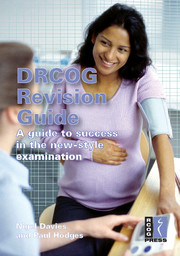Book contents
- Frontmatter
- Contents
- Foreword
- About the authors
- Acknowledgements
- Abbreviations
- 1 Introduction
- 2 The curriculum
- 3 Syllabus
- 4 The new DRCOG examination
- 5 Extended matching questions
- 6 EMQ paper one
- 7 EMQ paper two
- 8 Single best answer (best of five) questions
- 9 Single best answer paper one
- 10 Single best answer paper two
- 11 Multiple choice questions
- 12 MCQ paper one
- 13 MCQ paper two
- 14 Ten tips for candidates
- 15 Answers
- Mock examinations answer sheets (blank)
- Index
3 - Syllabus
Published online by Cambridge University Press: 05 August 2014
- Frontmatter
- Contents
- Foreword
- About the authors
- Acknowledgements
- Abbreviations
- 1 Introduction
- 2 The curriculum
- 3 Syllabus
- 4 The new DRCOG examination
- 5 Extended matching questions
- 6 EMQ paper one
- 7 EMQ paper two
- 8 Single best answer (best of five) questions
- 9 Single best answer paper one
- 10 Single best answer paper two
- 11 Multiple choice questions
- 12 MCQ paper one
- 13 MCQ paper two
- 14 Ten tips for candidates
- 15 Answers
- Mock examinations answer sheets (blank)
- Index
Summary
The syllabus is an outline of the main points of the curriculum and is designed to aid your learning for the DRCOG examination. The syllabus is correct at the time of publication but may change with time. An updated version of the syllabus will be available on the RCOG website (www.rcog.org.uk)
The syllabus is also divided into seven modules based upon the curriculum.
Module 1: Basic clinical skills
You will be expected to understand the patterns of symptoms in women presenting with obstetric problems, gynaecological problems, sexually transmitted infections and patients in a family planning setting.
You will be expected to demonstrate an understanding of the patho-physiological basis of physical signs and understand the indications, risks, benefits and effectiveness of investigations in a clinical setting.
You will be required to demonstrate an understanding of the components of effective verbal and nonverbal communication.
You will need to be aware of relevant ethical and legal issues including the implications of the legal status of the unborn child, the legal issues relating to medical certification and issues related to medical confidentiality. You will be expected to understand the issues surrounding consent in all clinical situations including postmortem examination and termination of pregnancy.
- Type
- Chapter
- Information
- DRCOG Revision GuideA Guide to Success in the New-Style Examination, pp. 27 - 30Publisher: Cambridge University PressPrint publication year: 2008



